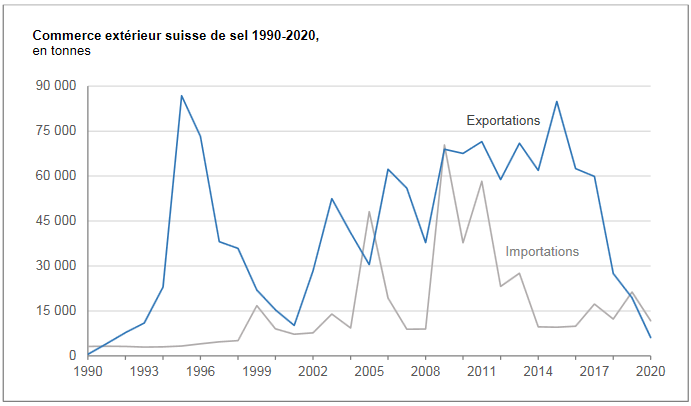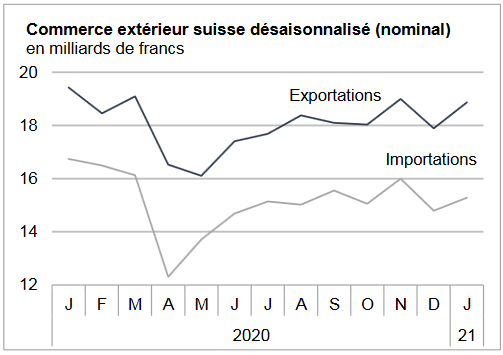Swiss foreign trade in salt has plummeted since 2010. Over the past ten years, exports have plunged 91% to 6,084 tonnes and imports by 69%. In 2019 and 2020, the amount of salt imported was greater than that exported, a phenomenon that had not occurred since 2009. In 2020, salt exports totaled 6,084 tonnes, one eleventh from their 2010 level, or down 91% over the decade. They had not reached such a low level since 1991. Imports, for their part, have plummeted by 69% over the past ten years. In 2019, they were higher than exits for the first time since 2009 in volume. This situation repeated itself in 2020 with 11,674 tonnes imported. The evolution of the price of salt followed a path diametrically opposed to that of the quantity imported and exported. In fact,
Topics:
Swiss Customs considers the following as important: 2) Swiss and European Macro, 2.) Trade Balance News Service Bunt [FR], Featured, newsletter
This could be interesting, too:
RIA Team writes The Importance of Emergency Funds in Retirement Planning
Nachrichten Ticker - www.finanzen.ch writes Gesetzesvorschlag in Arizona: Wird Bitcoin bald zur Staatsreserve?
Nachrichten Ticker - www.finanzen.ch writes So bewegen sich Bitcoin & Co. heute
Nachrichten Ticker - www.finanzen.ch writes Aktueller Marktbericht zu Bitcoin & Co.
Swiss foreign trade in salt has plummeted since 2010. Over the past ten years, exports have plunged 91% to 6,084 tonnes and imports by 69%. In 2019 and 2020, the amount of salt imported was greater than that exported, a phenomenon that had not occurred since 2009.
| In 2020, salt exports totaled 6,084 tonnes, one eleventh from their 2010 level, or down 91% over the decade. They had not reached such a low level since 1991. Imports, for their part, have plummeted by 69% over the past ten years. In 2019, they were higher than exits for the first time since 2009 in volume. This situation repeated itself in 2020 with 11,674 tonnes imported.
The evolution of the price of salt followed a path diametrically opposed to that of the quantity imported and exported. In fact, over the last ten years, prices have tripled in both directions of traffic. In 2020, the average price per kilo was 35 cents at the exit compared to 83 cents at the entry, registering at the same time a record level for each flow. In 2020, Germany took center stage with 4,100 tonnes transported in both directions of traffic and thus accounted for more than 36% of imports; moreover, a few years earlier, the germanic neighbor avaitevinced France (part2020: 34%) from first place. At the exit, a market was almost wiped off the map. In fact, Italy, which has long been the main outlet with Germany (part2020: 68%), has seen its arrivals of Swiss salt level off at only 64 tonnes. France, meanwhile, also occupied second place on the podium in this direction of traffic (share: 27%). |
Cooking salt: the quantity imported has doubled in years
Unlike the salt trade in general, imports of cooking salt have followed an upward trend. Over the past ten years, they have doubled to 8,350 tonnes in 2020, or 72% of salt arrivals. In 2010, cooking salt represented only one tenth of total salt imports.
Tags: Featured,newsletter









